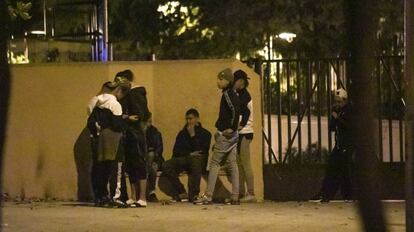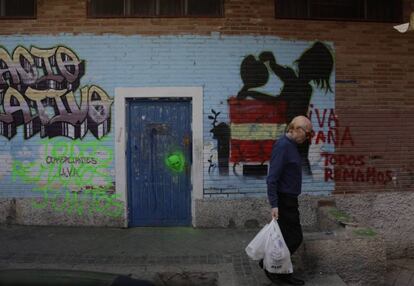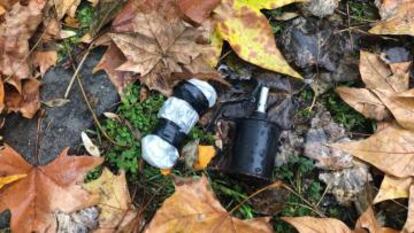Staff at minors’ center targeted with grenade: ‘This is not an isolated event’
Employees say that xenophobia is on the rise in Madrid’s Hortaleza district, where there have been a number of attacks against migrant youths

On Wednesday morning, a military-grade grenade was thrown over the wall of a center for minors in the Hortaleza district of Madrid. On October 30, 30 young men tried to storm the center. On October 5, two masked men approached a bus stop nearby. When they got there, they beat two young Arab-looking men with rowing oars. The attack happened in the middle of the day. No one in the neighborhood can say with certainty who the perpetrators were. “It’s an isolated incident,” the local spokesperson from the center-right Ciudadanos (Citizens) party said at the time. The next day, there was graffiti on the bus stop: “We all row together. Viva Spain.”
The first people hurt by what happened this morning are the minors and the tutors
Statement from staff at the center
At 7.30pm on Wednesday, workers from the center distributed a press release after the grenade was found: “The first people hurt by what happened this morning are the minors and the tutors, who are overwhelmed with non-stop work-related stress. The event today cannot be considered isolated.” The device did not explode, and was destroyed by the authorities.
“We know there are WhatsApp groups and Facebook pages that are inciting attacks against these children,” says Lourdes Reyzabal, the president of Roots Foundation, speaking by phone. “We would prefer not to say anything about the events of [Wednesday] morning until we know for certain what happened.” The foundation has reported acts of aggression against more than 20 children to the public prosecutor.

Hortaleza is one of the 21 districts in Madrid. It is home to 190,000 people, who are divided among six neighborhoods: Canillas, Valdefuentes, Apóstol Santiago, Piovera and Palomas. The average household income varies between €32,000 in Pinar del Rey, which is the average in Madrid, up to €101,000 in Piovera. There are 17,125 foreigners (9.3%) living in the district.
In Pinar del Rey, there are two centers under the guardianship of Madrid’s regional government: one for minors up to 14 years old, and another for teenagers aged between 14 and 18. These centers were built to help the children of families who had been evicted from their homes by banks, children who had been abused, and victims of sexual abuse. But they are also acting as centers for unaccompanied migrant minors.
We are right in the center of xenophobia. This is the tipping point, we cannot work like this
A tutor from the center
“The center for the older minors [14-18] has two floors and has room for 50 people, but this [limit] is never respected,” says a tutor from the center. “We are right in the center of xenophobia. This is the tipping point, we cannot work like this.”
According to official figures from the previous Madrid regional government, more than 1,570 foreign children and adolescents arrived in Madrid in 2018 – around 130 a month, a little more than the 980 who arrived in 2017.
“The children are the first victims in all of this,” says Sofía Mauleón, 43, at the doors of the center. “The chat groups from my daughter’s school are horrifying. They are creating xenophobia, and this neighborhood has never been xenophobic.”
Dori, 54, a resident of the area, was not aware that a grenade had been thrown at the center. As for the migrant minors, she says: “I see them sniffing glue, but they have never done anything to me.”

But other locals are more critical. Ricardo, 56, says: “Everyone is worried about [the migrant minors]. We have protested every Sunday for them to sort out the situation once and for all. There is a complete lack of control. They jump the fences, they enter… Only the residents know what we are suffering here.”
“I know that there are people who attack these guys, but I don’t support that,” says Javier Colmenares, 28. “They stole my roommate’s cellphone,” he adds.
The leader of the far-right party Vox, Santiago Abascal, has also complained about the centers. During the election debate ahead of the November 10 poll, he said: “I live in a working-class neighborhood in Madrid, where there is a center for foreign minors, and every time I go out, women come up to me and say that police have told them not to go out wearing jewelry.” This was heard by the 8.6 million Spaniards who tuned in to the debate.
Over the last year, Vox politicians have campaigned outside the doors of the minors’ center in Hortaleza
According to figures from the city council, in the last 60 days, police have been involved in 18 incidents in the area: five for weapons possession, and 15 for drugs. In the Centro district, those figures are much higher: 114 incidents, 179 for weapons and seven for drugs.
Over the last year, Vox politicians Javier Ortega Smith, the party’s spokesperson in Madrid City Hall, and Rocío Monasterio, the leader of the far-right party’s Madrid regional branch, have campaigned outside the doors of the minors’ center in Hortaleza. “We have to act in neighborhoods overrun by illegal immigration,” said Smith. “Women now can no longer walk alone,” added Monasterio in a speech in October.
At the repeat general election in November, the Socialist Party (PSOE) of caretaker Prime Minister Pedro Sánchez received the highest percentage of the vote in the streets where the minors’ centers are located. The Socialists won 28%, the conservative Popular Party came in second with 22%, while Vox took 17% of the vote – a jump of five percentage points from the April 28 election. On Thursday morning, Vox officially condemned the grenade attack against the center.
The investigation into who threw the grenade remains open. The culprit or culprits remain unknown. Sofía, a social worker who has worked with the children, blames the situation in the neighborhood on the mismanagement of all authorities: central, local and regional. “In the end, this is like a phantom house, and the youngsters have a terrible sense of uprootedness.”
English version by Melissa Kitson.
Tu suscripción se está usando en otro dispositivo
¿Quieres añadir otro usuario a tu suscripción?
Si continúas leyendo en este dispositivo, no se podrá leer en el otro.
FlechaTu suscripción se está usando en otro dispositivo y solo puedes acceder a EL PAÍS desde un dispositivo a la vez.
Si quieres compartir tu cuenta, cambia tu suscripción a la modalidad Premium, así podrás añadir otro usuario. Cada uno accederá con su propia cuenta de email, lo que os permitirá personalizar vuestra experiencia en EL PAÍS.
¿Tienes una suscripción de empresa? Accede aquí para contratar más cuentas.
En el caso de no saber quién está usando tu cuenta, te recomendamos cambiar tu contraseña aquí.
Si decides continuar compartiendo tu cuenta, este mensaje se mostrará en tu dispositivo y en el de la otra persona que está usando tu cuenta de forma indefinida, afectando a tu experiencia de lectura. Puedes consultar aquí los términos y condiciones de la suscripción digital.








































